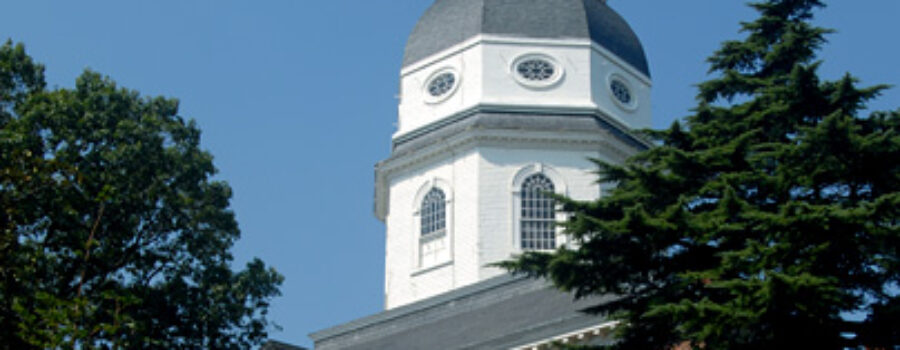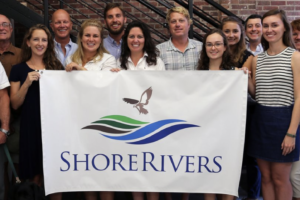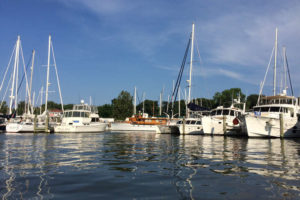Maryland General Assembly Wins
To say that it’s been an unusual year is an understatement! The pandemic has impacted every facet of life, and the 2021 Maryland General Assembly Session was no exception. Public participation, which is key to our democratic process, was limited to remote access this year. Despite all of the limitations, elected officials and advocates overcame the challenges and delivered some significant wins for the environment.
Headquartered in Annapolis, Chesapeake Legal Alliance has strong ties to the General Assembly. This year we were proud to work with partners and allies on a number of bills that will improve environmental protection.
Transparency in Environmental Compliance Data HB0204/SB0324 (Del.Lierman/Sen.Elfreth)
Requires Maryland Department of the Environment (MDE) and Maryland Department of Natural Resources (DNR) to post information regarding environmental permit violations and enforcement of natural resource protection laws online. Improves agency transparency and public access to information regarding pollution violations that impact our air and water quality and public health. Saves time and money by avoiding the need for many public information act requests through proactively putting basic, nonconfidential information online. Access to this information is critical for the public to exercise their enforcement rights under the federal Clean Water Act.
CLA staff was proud to work with Sponsors Del. Lierman and Sen. Elfreth to draft and support this important bill that will help to improve accountability and enforcement of environmental laws. Click here to read more.
Enhancing the Impact of Bay Restoration Funds HB0507/SB0119 (Del. Stein/Sen. Guzzone and Elfreth)
Reauthorizes and modifies the existing Clean Water Commerce Act (CWCA) through June 30, 2030, and requires MDE to dedicate $20 million annually from the Bay Restoration Fund (BRF) for specific water quality improvement projects. Establishes set-asides of the annual $20 million fund to stimulate investment in priority including: (1) agricultural pollution reduction practices, with priority given to certain types; (2) projects established in communities disproportionately burdened by environmental harms; and (3) landscape restoration projects.
This bill is important because it could provide a major boost towards Maryland reaching its 2025 Bay cleanup goals. CLA staff and volunteer attorneys were proud to help the Chesapeake Bay Commission develop and draft this bill. Read more about this bill here.
Environmental Justice Commission Reform HB1207/SB0674 (Del. Bridges/Sen. Elfreth, Griffith, Waldstreicher, and West)
Reforms the Maryland Environmental Justice and Sustainable Communities Commission, a body that is primarily responsible for: (1) reviewing and analyzing the impacts that State laws, regulations, and policies have on the issue of environmental justice; and (2) recommending options for addressing issues, concerns, or problems related to environmental justice. This legislation modifies and expands the Commission’s duties, requires the Commission to hold community listening sessions, makes meetings more accessible to the public, updates Commission membership requirements, and prioritizes racial justice by ensuring compliance with federal laws.
CLA Staff and Spring Law Clerks collaborated with Maryland League of Conservation Voters to create critical amendments to increase public participation with a focus on ensuring those most impacted by environmental and public health hazards are prioritized in the functions of the commission.
Stormwater, Climate Change, and the Bay Cleanup HB0295 / SB0227 (Del. Love/Sen. Elfreth)
Requires the Maryland Department of the Environment (MDE)’s stormwater management regulations to keep pace with our changing climate. This legislation requires MDE to update Maryland’s stormwater management regulations and criteria every five years to incorporate updated precipitation data; conduct public outreach and consult with a wide array of stakeholders, including the Chesapeake Bay Commission and the state’s environmental justice commission; provide an initial report in November 2021 on plans to update precipitation data; and submit a plan to the U.S. Environmental Protection Agency to ensure that all nutrient and sediment pollution estimated by the Chesapeake Bay Program and its Bay Model to be caused by climate change are fully offset by the Bay cleanup deadline of December 31, 2025.
This is important because increased seasonal rainfall due to climate change is increasing the volume of stormwater, which threatens public safety from floods and inundates our waterways with pollution. CLA staff worked with several advocacy partners, especially Waterkeepers Chesapeake, and also a broader array of stakeholders, such as local government staff, to help develop the bill’s core requirements and to draft the bill and review amendments.
Legal Intervention in Environmental Enforcement Actions HB0076 / SB0334 (Del. Love/Sen. Carter)
Ensures that Marylanders who are harmed by water pollution have the right to intervene in enforcement lawsuits. Although the federal Clean Water Act provides for this type of intervention, A decision by the Maryland Court of Special Appeals years ago made it essentially impossible for environmental groups and other citizens to intervene when the state sues a polluter. This bill gives people and communities who are harmed by pollution the ability to intervene in matters of water quality and pollution, as intended by the Clean Water Act.
Testing for Nitrates in Well Water HB1069 (Del. Stewart)
Creates a new requirement for owners of residential rental properties that rely on private wells to provide drinking water to test their wells once every three years. If the test shows that the drinking water is contaminated beyond levels that the U.S. Environmental Protection Agency deems safe (or the Maryland Department of the Environment if they adopt more stringent criteria) the owner of the property must report that to the tenant, county, and State, and take immediate corrective actions, including providing safe drinking water. Longer term options include continuing to provide safe drinking water, remediation of the unsafe situation, or allowing the tenant to break their lease. CLA provided some support to our partners and allies, especially the Center for Progressive Reform, who helped the sponsor develop the bill and the many amendments to this bill. CLA and our partners continue to be concerned about unsafe drinking water, and about the prevalence of nitrates in well water for rural residents around the Chesapeake Bay watershed, and especially on the Delmarva Peninsula.
State Budget: Filling Vacant Environmental Inspection Positions HB0588
For the fourth year in a row the General Assembly’s budget committees have directed $400,000 in state funds for the Maryland Department of the Environment and Department of Agriculture to ensure that it is used specifically for purposes of filling vacant inspection and enforcement positions. The budget item also requires the departments to report to the General Assembly quarterly on the number of inspection and enforcement staff and efforts to address staffing shortages. CLA research over the past several years has documented the long-term decline in staffing levels and overall budgeted resources and has been calling on the General Assembly to address the situation given the critical deficiencies and the enormous role that these staff serve in ensuring the Clean Water Act and Maryland’s water pollution laws are implemented and enforced. No matter how successful CLA and our partners are in our advocacy efforts, we will not restore the Chesapeake Bay nor protect local communities and waters without fully staffed agencies.
Ones to Watch
While these bills didn’t pass this year, environmental advocates including CLA worked on several other important bills that may be reintroduced in future legislative sessions.
Environmental Rights Amendment HB0082 / SB0151 (Del. Fisher, Barron, and Stewart/Sen. Patterson).
This proposed constitutional amendment would have established that every person has the “fundamental and inalienable right to a healthful environment, including the right to clean air, water, and land, a stable climate, and the preservation, protection, and enhancement of ecological, scenic, and historic values of the environment.” The amendment would authorize the State, a local government, or any person to enforce these rights against any government entity. Every person would also have the right to intervene in a suit by the State or local government. The bills seek to establish that the State’s natural resources are the common property of every person. If they had passed, the bills would have put to Maryland voters in November 2022 whether to amend the constitution to establish an environmental rights amendment as several other states have done. In broad terms, the amendment would give Marylanders an actionable right to bring suit to either protect the environment from a harmful proposal by a State or local government or to hold the State or local government to act as a trustee of Maryland’s natural resources. CLA is a supporter of this campaign because it would fundamentally alter the way in which the Maryland government protects our air, water, climate, and natural resources.
Climate Appropriate Development Siting HB0512 / SB0528 (Del. Lehman/Sen. Elfreth)
This bill would have expanded existing provisions that are currently only applicable to State or local construction projects to also apply to private projects, such that they must be in compliance with Maryland’s “Coast Smart” siting and design criteria. Essentially, the bill would ensure that anyone who wants to build on land that is likely to flood due to precipitation, hurricanes, or sea level rise, all of which are becoming more frequent and devastating because of climate change, would need to adhere to certain siting and building design requirements. This bill, if it becomes law, will not only prevent costly property damage, but also protect water quality as flooding of developed lands inevitably results in pollution and possibly toxic contamination. CLA helped our partners develop the bill prior to the 2020 legislative session through policy and geospatial research and analysis.




